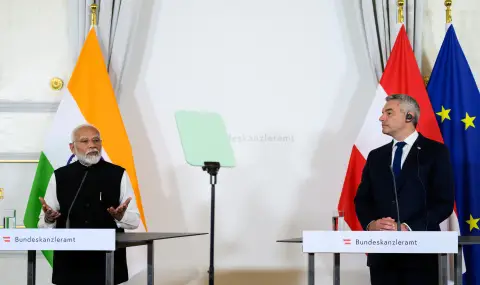Indian Prime Minister Narendra Modi discussed war in Ukraine with Austria, a key ally of Kiev, which pursues a policy of military neutrality, the Associated Press reported. In the talks, Modi emphasized the need for diplomacy, a day after his meeting with Russian President Vladimir Putin, BTA quoted.
Modi's visit is the first in more than four decades. The important meeting between the Indian Prime Minister and Austrian Chancellor Karl Nehhammer sparked talks and hopes for peace and diplomacy on a global scale.
During their discussions, Chancellor Nehammer emphasized the importance of understanding India's position on the ongoing war in Ukraine. He praised India's participation in a peace meeting in Switzerland, highlighting it as a crucial step towards peace. Nehammer expressed Austria's commitment to finding peaceful solutions to conflicts.
The Indian Prime Minister's visit to Moscow, an important ally of India, was his first since the escalation of the conflict in Ukraine.
In his talks with Russian President Putin, the Prime Minister maintained India's neutral stance on the invasion. He also mentioned the massive Russian airstrike across Ukraine on Monday, which hit the largest children's hospital in Kyiv and killed at least 42 people, including several children, in various locations, BTA reports.
Both leaders engaged in extensive discussions on various global conflicts, with particular emphasis on the situation in Ukraine. They agreed that military solutions are not the answer and stressed the importance of protecting innocent lives.
The Prime Minister reiterated India and Austria's shared belief in the power of dialogue and diplomacy to quickly restore peace. Both sides expressed readiness to achieve this goal.
Modi and Nehammer chose not to take questions from journalists after their meeting.
